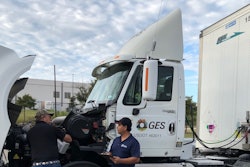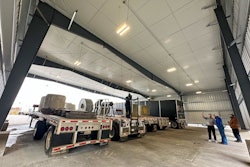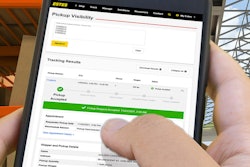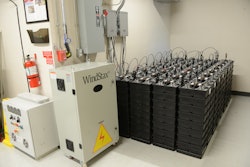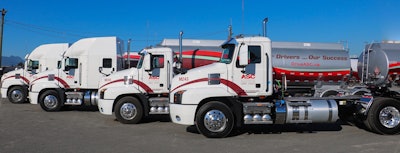
CCJ Innovators profiles carriers and fleets that have found innovative ways to overcome trucking’s challenges. If you know a carrier that has displayed innovation, contact CCJ Chief Editor Jason Cannon at [email protected] or 800-633-5953.
When a driver for Alchemist Specialty Carriers (ASC) fills their tanker at a customer’s yard, the customer asks the driver to go around the yard and slam on the brakes a couple times for testing purposes before hitting the road. ASC Owner Glen Parsons said those are the only hard brakes the company has now.
When Parsons first purchased the bulk liquid and hazardous materials hauler based in Langley, B.C., hard braking events – as well as speeding violations and turnover – were abundant. Turnover was at a whopping 75%.
Parsons’ “people first” philosophy pulled the teetering company back on the right road.
“Our people come first, our customers come second, and our profits come third,” he said. “I think that approach of people first is one that's highly effective, and it's going to get us to where we want to be.”
He approaches that philosophy in a simple way: he looks at trucking like the construction industry. One of his colleagues owns a construction company, and all his workers are paid by the hour. Parsons said he classifies a driver in the same category, so he decided early on to change ASC’s pay model.
And it has made all the difference.
“We’ve seen a dramatic drop in everything. We’ve had no at-fault accidents this whole year,” Parsons said. “We have speed gauges and hard braking (notifications) with Samsara cameras; we’ve gone down to very minimal situations where we have a hard brake. We don't have hardly any infractions for speeding anymore. We used to have a lot of problems with overspeed.”
And turnover has gone down to 2%. The company has had only a single driver quit in the past 12 months.
A hybrid approach
ASC went from paying drivers by the mile to paying them by the hour.
“This old adage of being paid by the mile, and all this free time that was allowed to shippers and receivers and all that, it doesn't fit the fairness test,” Parsons said.
So he and his team designed a plan based on time and distance.
The company knows the distance of any run and how much time it should take to complete that run. Though he knows a truck can go faster, the benchmark he uses is 45 miles per hour because, after checking its Samsara platform for a year, he found that drivers were averaging around 48 to 50 miles an hour. The 45-mph benchmark gives leeway for things like traffic and allows drivers to make up time and money on longer runs. For example, if a typically 10-hour run only takes 9.5 hours, the driver is still paid for the additional 30 minutes. And any time over 60 hours in a week is paid overtime.
He said the drivers like this model, too, because they have a better idea about what their paycheck will be.
ASC didn’t entirely throw out a mileage-based pay system because Parsons said it wouldn’t work without a lot of repercussions.
The hybrid model, he said, protects against drivers abusing the system. He had a newer driver who would drag out his time on the road so he would be paid more, while a senior driver making the same run got paid less because he was more efficient in getting the job done.
It also eliminates complaints from over-the-road drivers who perceived they were getting paid less than local drivers.
Now, the company’s highway drivers make around $40 an hour, and local drivers make around $38 an hour, bringing annual salaries to anywhere between $100,000 and $140,000 Canadian.
ASC also offers additional bonuses for long service, ranging from $500 for five years up to $1,000 for 10 years.
It also has a safety and compliance bonus program that offers drivers 3% additions to their wage up to $3,000 annually. This program tracks a number of safety and compliance items, including speeding, hard braking and rolling stops. Parsons said deductions for those items have dropped dramatically, and ASC’s safety manager is seeing very few offenses, commenting that almost all drivers are now receiving almost all of the bonus without deductions.
“The numbers are in the payout for compliance,” Parsons said.
A domino effect
Being paid for every hour worked has garnered ASC quite a few benefits.
Because drivers are no longer in a rush so they can get to their next load to keep the truck rolling and raking in more miles and, therefore, pay, they’ve slowed down, Parsons said.
The company uses Samsara to log driver hours as well as for safety coaching. The system warns drivers with in-cab alerts and gives them time to correct their actions.
This means fewer safety violations all around and fewer accidents, which gets the company a hefty worker’s comp rebate and a credit to the tune of about $12,000 from its insurance company.
Parsons said because of better safety, there have been zero damages to loads and equipment. The lack of speeding also creates better fuel economy, and the reduction in hard braking is saving wear and tear on the trucks, resulting in a savings on fuel, maintenance and equipment expenses, he said.
“It's paying back to us, I wouldn't say tenfold, but a lot more by having that driver that's very comfortable with their job and really loves where they work,” he said. “When you have a long-term driver and drivers that care about their job … they’re going to perform a lot better. We see that all the way across the board.”
The CCJ Innovators program is brought to you by Bestpass, Chevron Delo, Comdata and Freightliner Trucks.


